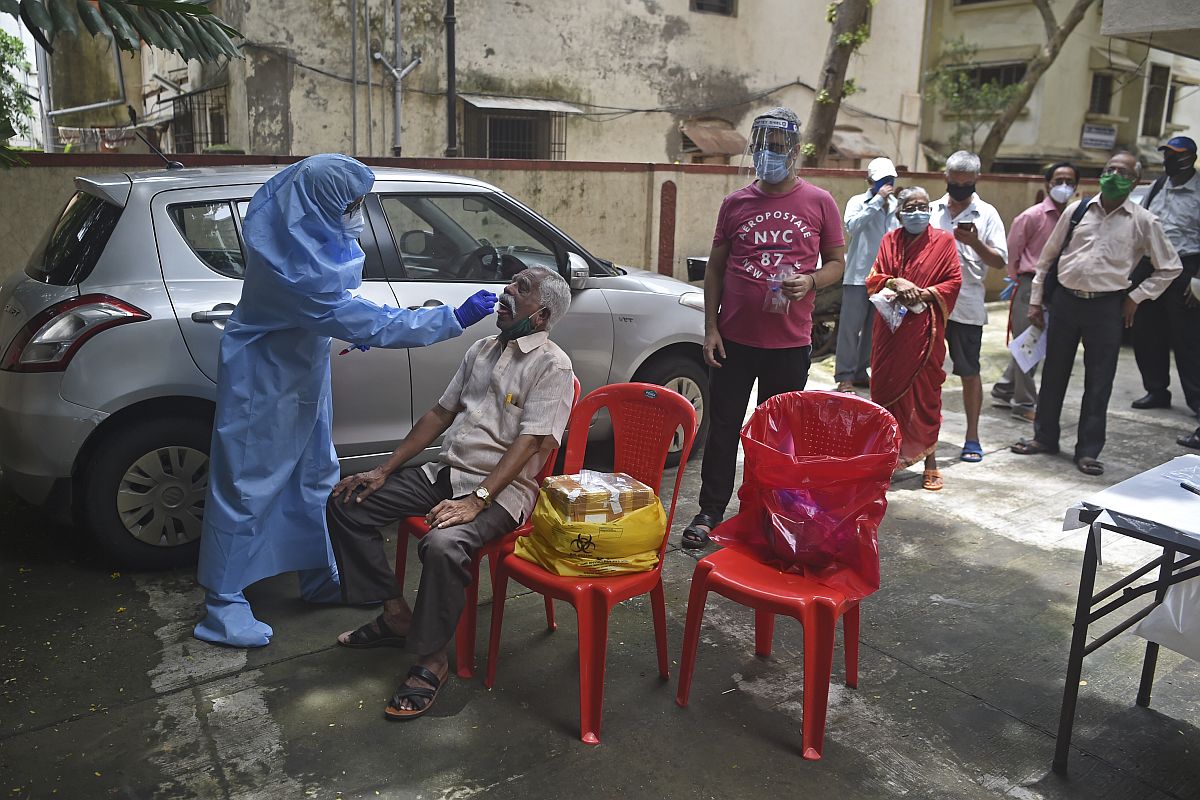Ed Westwick spotted in Mumbai, excited for India-Pakistan cricket showdown
Beyond cricket, there’s more excitement in Westwick’s personal life. The actor and his wife, actress Amy Jackson, are expecting their first child together.
For the fifth consecutive day on Tuesday, the Coronavirus pandemic continued a downward trend in Maharashtra with 7,717 new COVID-19 cases, the lowest in a fortnight and down from the highest tally of 10,576 on July 22.

A health worker wearing Personal Protective Equipment (PPE) gear collects a swab sample from a man as others wait for their turn during a medical screening for the COVID-19 coronavirus, at a residential building in Mumbai. (Photo: AFP)
Around 57 per cent of people living in Mumbai slums and 16 per cent from other residential areas (non-slums) in three wards were exposed to Sars-CoV-2 virus — that causes COVID-19 — and recovered silently owing to the antibodies produced, a serological surveillance study has found.
As many as 6936 samples were collected from three wards – R-North, M-West and F-North.
Advertisement
The study was conducted jointly by the NITI Aayog, the Municipal Corporation of Greater Mumbai and the Tata Institute of Fundamental Research. Samples were collected from volunteers in three municipal wards.
Advertisement
The survey found the prevalence of Coronavirus antibodies marginally higher in women.
The study has suggested that asymptomatic infections are likely to be a high proportion of all infections.
The higher prevalence of antibodies in slums has been attributed to the population density and shared common facilities like toilets, water points etc.
“Overall, we have observed that 40 per cent of those surveyed, in both slums and residential areas, were infected with COVID-19, but recovered. None of those tested for sero survey had to undergo RT-PCR test, as they were asymptomatic,” Suresh Kakani, additional commissioner, BMC was quoted as saying by Hindustan Times.
The study also pointed out that the fatality rate may be as low as 0.05-0.10 per cent, thanks to the effective containment efforts and active measures to isolate symptomatic cases by the Municipal Corporation of Greater Mumbai.
Lower sero-prevalence in non-slums could be due to better social distancing and access to better hygiene, in addition to intervention by MCGM to stem the spread of infection, the report said.
The report further stated that the results may be valuable to learn more about herd immunity. Although, it is still unclear what level of prevalence leads to herd immunity, the report stated that the findings indicate that at least in slums, “this could be attained sooner or later, if the immunity exists and persists in a significant proportion of the population”.
SARS-CoV2 Sero-Prevalence Study in Mumbai; NITI Aayog–BMC-TIFR Study – First Round Report. pic.twitter.com/687nUTl3Py
— माझी Mumbai, आपली BMC (@mybmc) July 28, 2020
“The first round report of Sero Surveillance for Covid-19 infection in Mumbai indicates that 57 per cent of slum population and 16 per cent of non-slum population have developed antibodies. Infection fatality rate is very low. Are we closer to herd immunity?” BMC’s Additional Municipal Commissioner Ashwini Bhide tweeted late on Tuesday.
BMC will conduct another sero surveillance next month in the same three wards for a comparative study to gauge the spread of COVID-19 infection.
Meanwhile, India’s commercial capital, Mumbai, on Tuesday saw its lowest single-day spike in three months with just 700 Coronavirus cases even as the city recorded its highest testing figures with nearly 9,000 tests.
Informing about the same on Twitter, Maharashtra minister Aaditya Thackeray described the increase in testing as “chase the virus in full capacity.”
For the fifth consecutive day on Tuesday, the Coronavirus pandemic continued a downward trend in Maharashtra with an added bonus in the form of the highest recoveries till date, health officials said.
The state notched 7,717 new COVID-19 cases, the lowest in a fortnight and down from the highest tally of 10,576 on July 22, though fresh cases continue to soar in the 7,000-plus levels in the second half of July.
The number of deaths continued in the 200-plus range with 282 fatalities on Tuesday – but still lower than the single highest toll of 298 on July 23.
The state recovery rate increased for the fourth day, jumping from 57.84 per cent to 59.34 per cent on Tuesday, while the current mortality rate stands at 3.62 per cent.
Mumbai recorded 717 new cases of Coronavirus on Tuesday, its lowest one-day rise in more than two months, taking the tally to 1,10,846, while 55 more patients died taking the total to 6,184, authorities said.
The recovery rate in Mumbai is 73 per cent while the doubling rate has climbed to 69 days.
Spelling glad tidings with the current status, a pleased Health Minister Rajesh Tope has claimed that Maharashtra has achieved the COVID-19 peak now and the cases will start declining from August 15 onward.
Advertisement